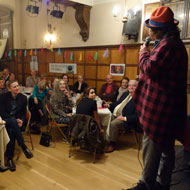Charity founded by veterinary nurse raises £2K

Guests enjoy entertainment at TOLFA's Holi cabaret night.
A charity founded by a British veterinary nurse has raised more than £2,000 to help support its work running an animal hospital and rescue centre in Rajasthan, India.
The charity, Tree of Life for Animals (TOLFA) hosted a Holi cabaret night in London. An ancient Hindu spring festival, Holi is also known as the festival of colours.
More than 60 people attended the event at the Club for Acts and Actors in Covent Garden on March 22. Guests saw performances from acts such as comedy band the Rudy Vees. Indian textiles, jewellery and Henna tattoos were also on offer.
The charity's managing trustee Dr Sue Bretherton discussed TOLFA's work, explaining how she gave up her career as a head teacher in order to train as a vet to help animals in India.
Veterinary nurse Rachel Wright, who founded the charity in 2005, spoke to guests via video link from India.
TOLFA's UK manager Clara Nowak said the charity works to care for abandoned, sick and injured animals, as well as caring for the stray dog population.
She said: "Every day [TOLFA] cares for more than 250 animals, many of which would have died under horrible circumstances on the streets had TOLFA not been there to rescue them. The team also runs free clinics for farmers and education programmes within schools and are involved with projects to eradicate rabies from the area.
"The level of suffering in the animal population is high and funds are always tight so we're so grateful to everyone who supported the Holi Cabaret Night. We all had a fantastic time and the presentations gave everyone a real insight into everyday life at the TOLFA hospital. Most guests were both laughing and crying by the end!"



 The Federation of Independent Veterinary practices (FIVP) has announced a third season of its podcast, Practice Matters.
The Federation of Independent Veterinary practices (FIVP) has announced a third season of its podcast, Practice Matters.